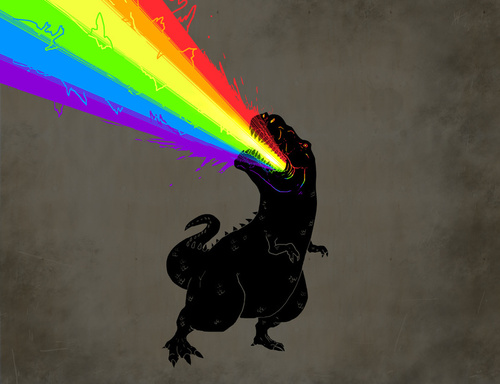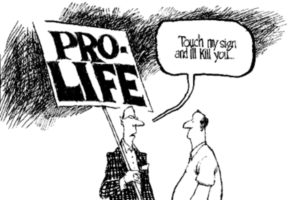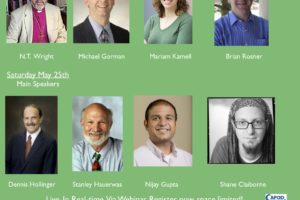Since publishing my article “I’m (Kinda Sorta Yeah Not Really) Gay” last month, I’ve received a lot of follow-up questions. Not so much about the article, but about the specifics of my struggle with same-sex attraction. Here are some of the most frequently asked questions.
When did you realize you were, you know, gay?
If you dig through my memory box, you’ll find a piece of paper decorated with hearts and a little stick figure. His name is Josh. This work of art was a kindergarten project where the teacher asked us to draw our best friend. But Josh wasn’t my best friend. He was just the boy who sat across from me in class. I guess you could say I was attracted to him. At five years old, “best friend” was the only phrase I had for that feeling. Long story short, I realized very early on I was different. I played with girls, got crushes on boys, asked Santa for ponies instead of G.I. Joes. But I didn’t have a term for it until junior high, when bullies came up with some for me: gay, homo, faggot. In a very real sense, the label was forced upon me, and still is today.
How did you tell your parents?
I was nineteen, home alone, reading in bed, when I stumbled upon these words: “Therefore, confess your sins to one another and pray for one another, that you may be healed” (James 5:16). When my parents got home, I called them to my room and said I had something to tell them. Back then I’d never heard the term same-sex attraction, so I used the one I knew: “I’m gay.” They knelt beside my bed. Mom held my hand and Dad asked why I didn’t tell them sooner. I don’t remember my answer, but the question is what really matters: it proved their love and concern. After the three of us prayed, we watched an episode of I Love Lucy (my favorite show before Lost came along) and had some tea.
A few weeks ago, my parents and I were thinking back on that night. Mom claimed she “always knew” I was attracted to the same sex, whereas Dad said he wasn’t sure. Either way, their response to my struggle was, and still is, one of God’s greatest gifts to me. They continue to pray for me, and we talk openly about homosexuality and the Christian faith. Maybe I can get them to blog about it sometime. (Leave them a comment below and we’ll see if a little peer pressure won’t do the trick.)
Did you tell anyone else?
Once I told my parents, I no longer considered it a secret. But that doesn’t mean I shouted it from the rooftops. On the contrary, my circle of support remained small until about two years ago. That’s when I started to confide in Christian friends. At first, “the conversation” (as it came to be called) was a big deal, had through sweat and tears. Literally! We’re talking sweat circles and bloodshot eyes. But the more people I told, the easier it became. I kept a list of confidants in a small, red, spiral-bound notebook. Before long, the book was filled with names—church friends, coworkers, schoolmates. Finally, on September 26, 2012, I added “the world” and put the notebook away.
Why did you decide to speak up about same-sex attraction?
Honestly, I always intended to keep quiet. But as I began studying homosexuality, I noticed the bulk of biblical resources came from heterosexual pastors, or people who’d been freed from homosexual desires. Where were all the Christians who still experienced same-sex attraction? At that time I’d only found one book, Wesley Hill’s Washed and Waiting: Reflections on Christian Faithfulness and Homosexuality (2010), a small paperback that I devoured within hours. We need more books like this, I thought. More Christians willing to speak up about their own fight against homosexuality. I couldn’t sit back and wait for someone else to do it. I was that person.
Do you believe God can change you?
I believe God can do anything. He can part the sea, heal the sick, raise the dead. And yes, certain people, by God’s grace, have experienced real and lasting change in their sexual desires. Some have even married and started families. I couldn’t be happier for the people who tell those stories. But that’s their story, not mine. My story involves God working in ordinary ways, through the slow and steady process of sanctification. God gets glory in those stories, too.
Have you tried to be straight?
If by “try” you mean signing up for conversion therapy, then no. I don’t support programs that attempt to change a person’s sexual orientation by behavior modification. Not even with Bible verses thrown in.
If by “try” you mean taking girls on dates, then no. I’ve certainly gone on dates (mostly in high school), but not because I was trying to reorient myself. Mostly I wanted to have fun with friends, and my friends were female.
If by “try” you mean setting my sights on a godly woman with the intent to marry, then no. I realize this is an option for Christian men who struggle with same-sex desires, but believe it or not, I’m actually pursuing singleness. (More on this in upcoming articles.)
If by “try” you mean asking God to make me straight, then yes, and not with much luck. That turned into straight idolatry.
Bottom line: there’s more to sanctification than becoming straight. By the time I’m glorified, I’m not sure “straight” will matter much anyway. If something happens before then, great! For now, I’m serving God as a happy, single, celibate man.
Why can’t you just be gay?
I’ve heard this question a lot lately, from well-meaning people who hope I’ll someday embrace homosexuality, marry a man, settle down, adopt a baby, and live happily ever after. To be honest, sometimes I do desire those things. Those desires are real and intense. But I also believe they’re sinful. Welcome to the already/not yet, where Christians continue to live with conflicting desires. “For the desires of the flesh are against the Spirit, and the desires of the Spirit are against the flesh, for these are opposed to each other, to keep you from doing the things you want to do” (Galatians 5:17). Did you catch that last part? Some desires, real as they are, actually keep us from doing what we want to do. As a Christian, I want to do God’s will. I can’t be gay because I don’t believe it’s God’s will for human sexuality. For more on this, check out some of my articles on homosexuality here at The Two Cities, particularly “Forced to Be Gay.”
How have people responded to your “coming out” article?
A quick glance at the 160 comments on “I’m (Kinda Sorta Yeah Not Really) Gay” will give you an idea. Generally, the online response from believers has been positive, while the world’s reaction has been a combination of anger, concern and confusion. I’ve definitely received some, shall we say, “colorful” comments in the blogosphere.
But in the real world, the response has been pretty unremarkable. That’s a good thing. As a worship leader in my church, I was concerned that, for some people, my transparency might be a distraction or a stumbling block. But the Sunday following my “coming out” was worship as usual. (I don’t think it came as a big surprise to anyone.) No rifts, no rejections, no raids. Only love, prayers and support. If anything, I’m closer to my brothers and sisters in Christ than ever before. I hope that’s an encouragement to anyone who’s thinking about sharing his or her struggles with other believers. (And I hope someday you do!)
Bryan can be reached at The Happy Alternative





23 Comments
Leave your reply.